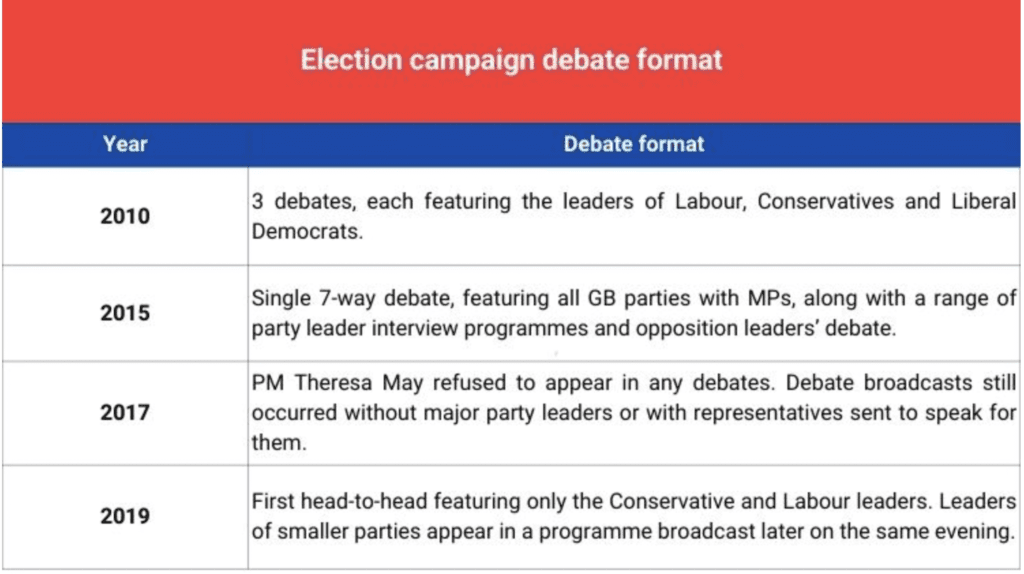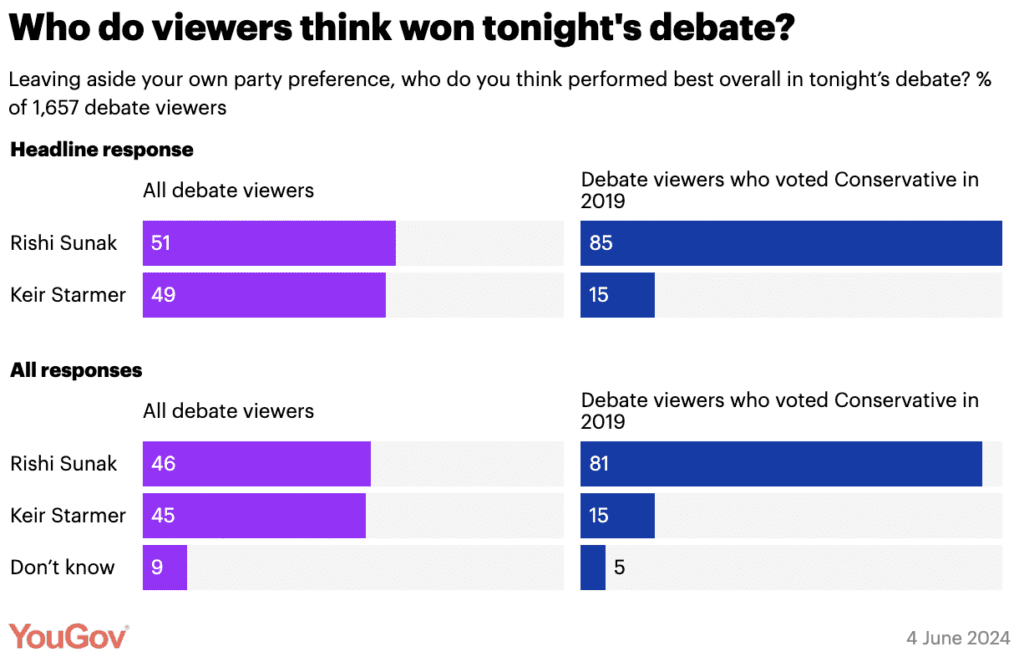Last week saw one of the final significant events before voters head to the polls – the BBC Leader debate. The debate was widely viewed as a critical opportunity for Prime Minister Rishi Sunak and one of Keir Starmer’s last public tests, despite a 22-point poll lead heading into the debate. Tensions were clearly high, not helped by reportedly sky-high studio temperatures, leading to an increase in personal attacks and making this the most combative debate of the campaign so far. But do debates really have any impact outside the ‘Westminster bubble?’
The history of the TV debate
The American-style TV debate was brought in in 2010 as a way of making a direct plea to voters – the idea being that this would be a way to engage with those that might normally be swayed by local doorstep politics. Prior to this, television debates were widely blocked by the incumbent party. It was generally the opposition that sought to gain from them. However, this changed under the leadership of Gordon Brown, with a perceived lack of charisma and failing personal popularity driving the Labour Government of the time to greenlight them for the first time so Brown could appeal directly to the electorate.
Since 2010, televised election debates have gone on to become a staple of campaigns, evolving in format according to party support, campaign strategy and leaders’ willingness to participate. Incumbent PMs have typically sought to fix the structure for their benefit (such as Cameron’s 2015 refusal to take part in the multi-leader debate) or the Liberal Democrats 2010 lobbying for a BBC Question Time format (in which questions are chaired by both an experienced journalist and an audience.)

Source: https://blogs.lse.ac.uk/politicsandpolicy/the-uk-needs-an-organised-system-for-tv-election-debates/
The varying debate formats we see today are a result of extensive behind-the-scenes wrangling between campaign teams and producers, with negotiations often happening up to the wire. The arrangement used in the 2010 negotiations, when three major broadcasters (BBC, ITV and Sky) moved together to negotiate as a unit, has since shifted considerably – with each broadcaster masterminding their own arrangements with campaign teams. This arguably leaves politicians better able to pick and choose which format best serves their campaign strategy, but doesn’t always leave room for compelling television.
Winners and losers?
It’s inevitable that politicos are always going to want a clear winner and loser from each debate – and it’s not always a straightforward dividing line. This doesn’t, however, stop attempts to find one. Broadly speaking, there are three main ways to test the ‘success’ of a debate – and which messages (if any) are landing:
1. Media surround sound
The most obvious example of which messages are getting cut-through is to look at the front pages, with acres of column inches dedicated to deciding who ‘won’ each debate. Of course, political leanings of papers do sway the headlines – as do the polls hosted on publications’ websites. For instance, the Express poll following the final BBC head-to-head debate found that 69% of readers thought Sunak won, with reports widely suggesting that Sunak had performed better, despite official YouGov polling suggesting a dead heat.
2. Snap polls day after each debate
Post-debate polls have this year generated mixed results, but nevertheless attempt to find ‘winners’ and ‘losers’ from each debate, with polling companies and publications alike publishing snap results the day after each debate.

Source: YouGov – ITV Election Debate snap poll
3. Viewing figures
While viewing figures started off strong, the widespread apathy of the electorate is clear in the dwindling numbers as the campaign has progressed. The Sun’s widely publicised YouTube debate only drew an audience of 7,000 at its peak – a figure which as the Guardian’s John Crace pointed out, is usually matched by non-league football teams.
Similarly, the final head-to-head debate, widely viewed as Sunak’s ‘last chance saloon’ to win hearts and minds had a peak viewing figure of 3m. (In contrast, the ITV coverage of the Georgia vs Portugal Euros game scored a peak audience of 6.4m.)
These low viewing figures are particularly stark when compared with 2019 numbers. This year’s ITV showdown between the PM and Starmer was watched this year by an average of just 4.8m viewers; down from the average audience of 6.7m for the same debate between Boris Johnson and Jeremy Corbyn in 2019.
GE 2024: A different breed of campaign
This has been a campaign like no other when it comes to voter responsiveness; the polls have largely remained stable where we would typically expect set piece debates to shift the dial considerably. Labour’s debate strategy has reflected its wider remarkably risk-averse campaign, while the Tories simply failed to use the debates to land any vote-winning narrative – with Sunak only dialling up the rhetoric for the final BBC head-to-head.
The lack of responsiveness of the polls to the debates speaks volumes both to the reticence of both parties to make any kind of misstep, and the quality and challenging format of the debates themselves – widely panned by mainstream media as being overly soundbite-led, with no party given time to get into the meat of policy thinking. Notable exceptions are those that allowed for long-form live individual interviews.
The Sky (Beth Rigby) Leaders’ Debate, in particular, was widely praised for putting significant pressure on both party leaders. The format used by Sky – of a live 1-2-1 interview with a journalist, followed by questions from the live audience – is easily the most compelling format of the election, but requires a highly skilled journalist to pull off successfully.
Despite facing the most apathetic electorate in recent years, both camps are struggling valiantly to use debates to inject life into their campaigns – with both clipping the sections that best suit them to push key messages on their social channels. However, as the polls show, little seems to be making real impact.
With every major poll predicting a major Tory wipeout, the Conservative campaign team is firmly in damage control mode – whether they have been successful in reversing the damage will become clear in a matter of days.